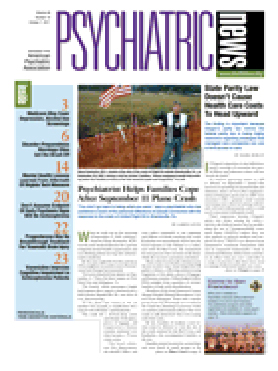The commonwealth of Virginia lacks sufficient jurisdiction to file a suit challenging the constitutionality of the Patient Protection and Affordable Care Act's individual mandate, ruled the U.S. Court of Appeals for the 4th Circuit on September 8.
The unanimous decision by the court's three-judge panel to reject the Virginia case follows two earlier rulings by federal appellate courts on the health care reform law. In June, the U.S. Court of Appeals for the 6th Circuit upheld the constitutionality of the law's mandatory insurance provision (Psychiatric News, August 5). Two months later, the 11th Circuit found the same provision to be unconstitutional (Psychiatric News, September 2).
On the same day that President Obama signed the Affordable Care Act, Virginia Attorney General Ken Cuccinelli (R) filed his challenge against the law's requirement that all U.S. citizens purchase health insurance coverage by 2014. While U.S. District Judge Henry Hudson ruled in favor of the state late last year (Psychiatric News, January 7), 4th Circuit Judges Diana Gribbon Motz, Andre Davis, and James Wynn rejected that lower court's decision on the ground that the individual mandate "imposes no obligations on the sole plaintiff, Virginia."
Cuccinelli argued that the Affordable Care Act's mandatory insurance provision is a violation of the Virginia Health Care Freedom Act (VHCFA), which prohibits any requirement that state residents obtain individual insurance coverage. But Motz rejected the state's argument, asserting that the timing of the VHCFA's enactment one day after the health reform law was signed reveals the express intention of state officials to declare opposition to the federal law's individual mandate.
Motz added that the court's acceptance of Virginia's right to challenge the health care reform law would establish a precedent by which "each state could become a roving constitutional watchdog of sorts." In a press statement issued on the day of the court's ruling, Cuccinelli expressed his disappointment with the judges' opinion and vowed to file an appeal.
Ruling Invokes Anti-Injunction Act
In a 2-1 decision, the 4th Circuit also rejected a suit brought by Lynchburg, Va.-based Liberty University. The private Christian college's challenge of the Affordable Care Act's individual mandate was thrown out by the court on grounds different from that in Cuccinelli's case.
In her majority opinion, Motz contended that any penalties collected by the federal government for failure to comply with the individual mandate would be considered taxes. Therefore, she concluded, the court lacks jurisdictional authority under the Anti-Injunction Act (AIA) to hear the case, as it "constitutes a pre-enforcement action seeking to restrain the assessment of a tax" that no one has yet had to pay.
Davis disagreed with the majority's argument in this case, but concurred that the case should be dismissed on merit. According to Davis, the health care reform law's individual mandate is "a proper exercise of Congress's authority under the Commerce Clause to regulate the interstate markets for health services and health insurance."
Court Finds Mandate Unconstitutional
At press time, U.S. District Judge Christopher Conner of the Middle District of Pennsylvania delivered a ruling in yet another case challenging the constitutionality of the reform law's individual mandate. Conner determined that the provision represents an unconstitutional attempt to remedy what he concedes is a "health care crisis."
"The power to regulate interstate commerce does not subsume the power to dictate a lifetime financial commitment to health insurance coverage," Conner wrote in his decision.
Conner also concluded that the individual mandate is inseverably tied to provisions requiring insurance companies to guarantee coverage for any who seek it and to forgo enforcement of preexisting condition clauses. The suit was brought by a self-employed married couple in Pennsylvania who said they opted out of health insurance coverage in 2001 because the cost of their premiums was greater than that of their mortgage payments. If appealed, the case will be heard by the U.S. Court of Appeals for the 3rd Circuit.

